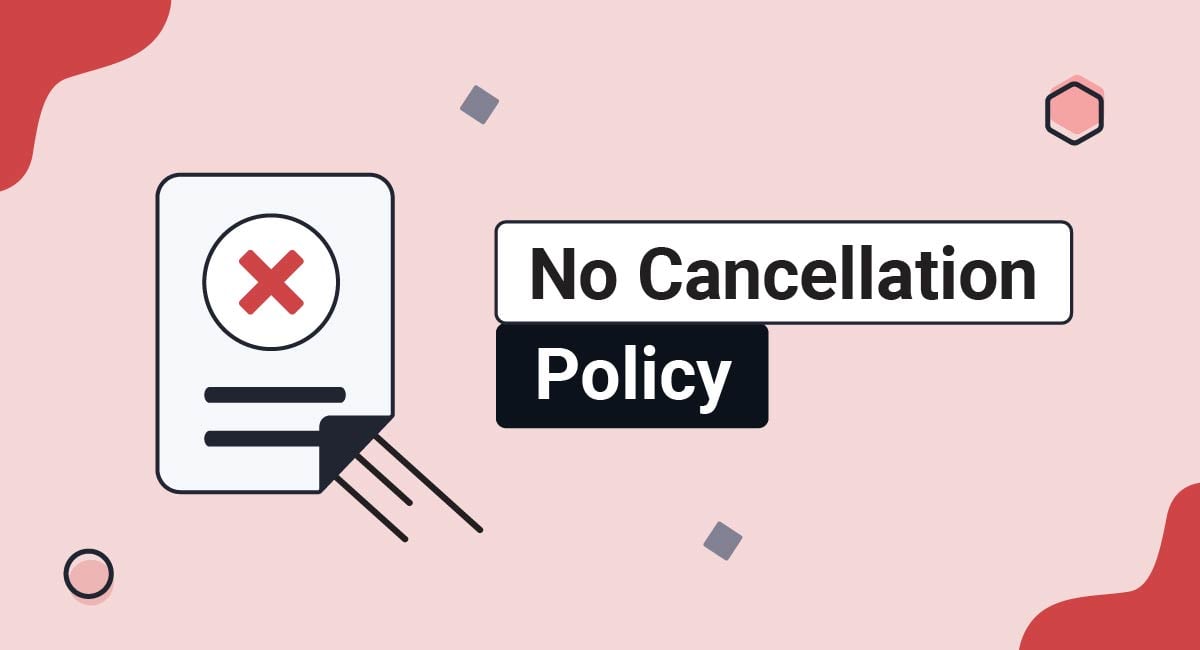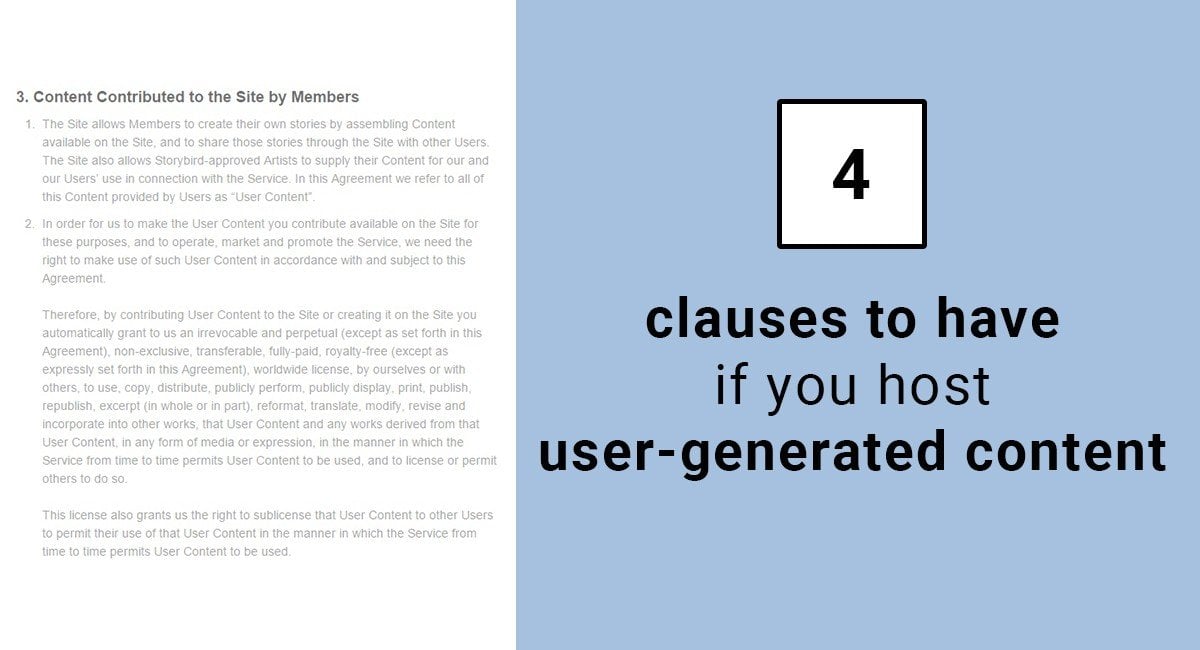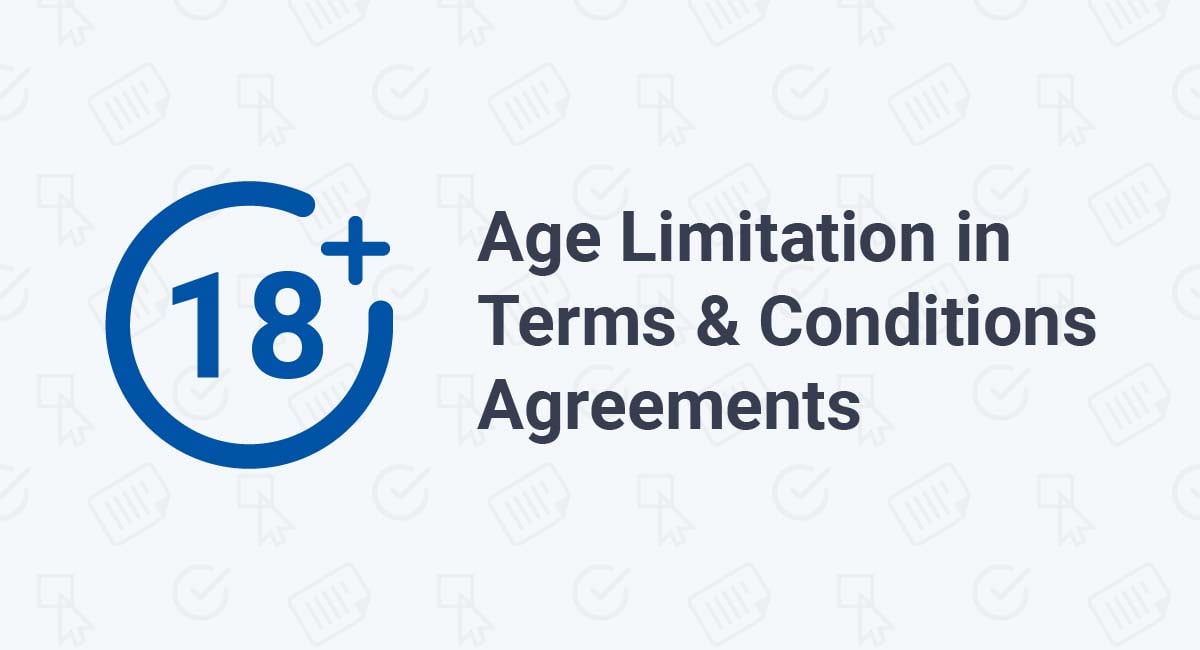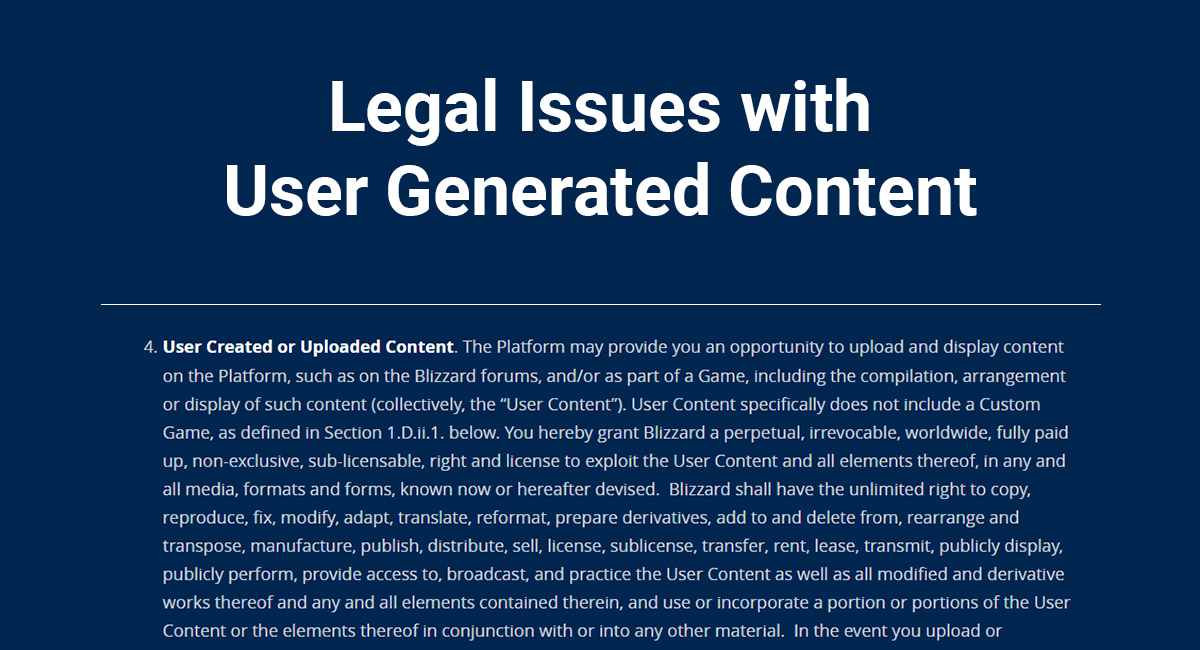A No Cancellation Policy informs your clients that they are obligated to pay for every appointment they schedule with your business, regardless of their attendance.
This policy is commonly used by service-focused businesses to help minimize workflow disruptions as well as avoid the loss of time and income that accompanies client appointment cancellations and no-shows.
In this article, we'll go into details about what a No Cancellation Policy is, why it's advisable for your business to have it, and how to draft, display, and enforce this policy. Let's get started.
Use our Return & Refund Policy Generator to generate a Return and Refund Policy for your store. Just follow these steps:
-
At Step 1, select where your Return & Refund Policy will be used.
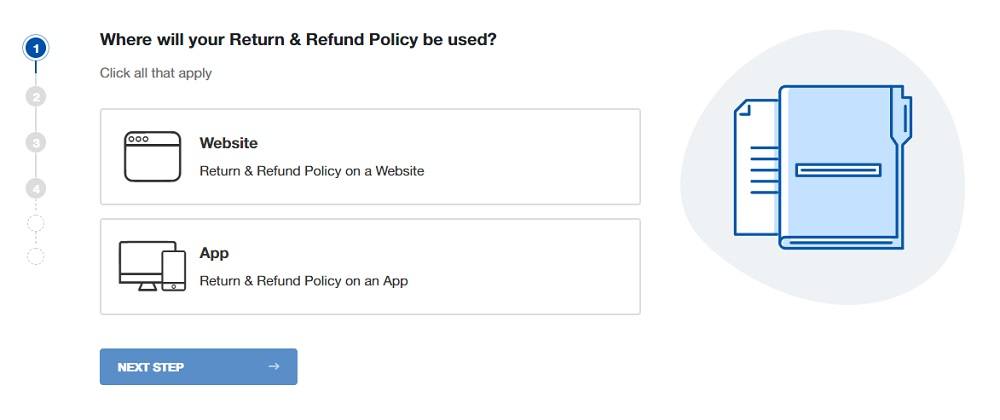
-
At Step 2, add information about your website/app and business.
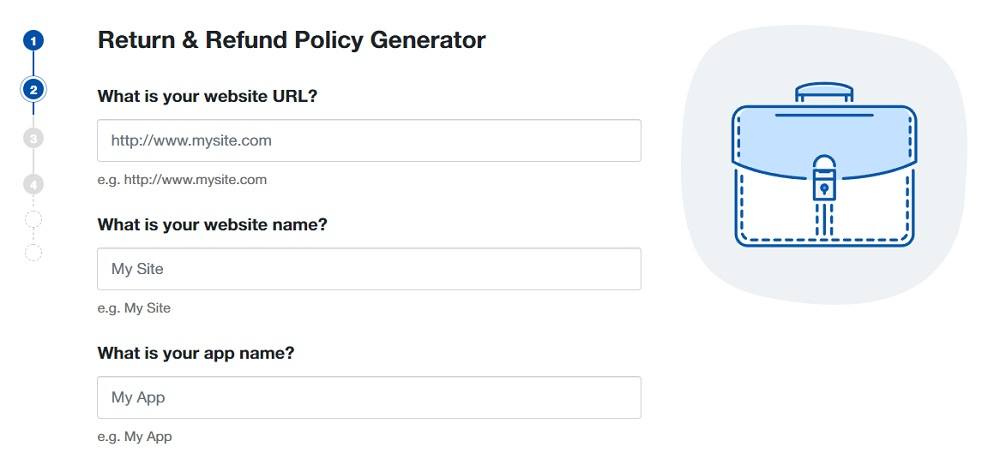
-
Answer some questions about your business practices.
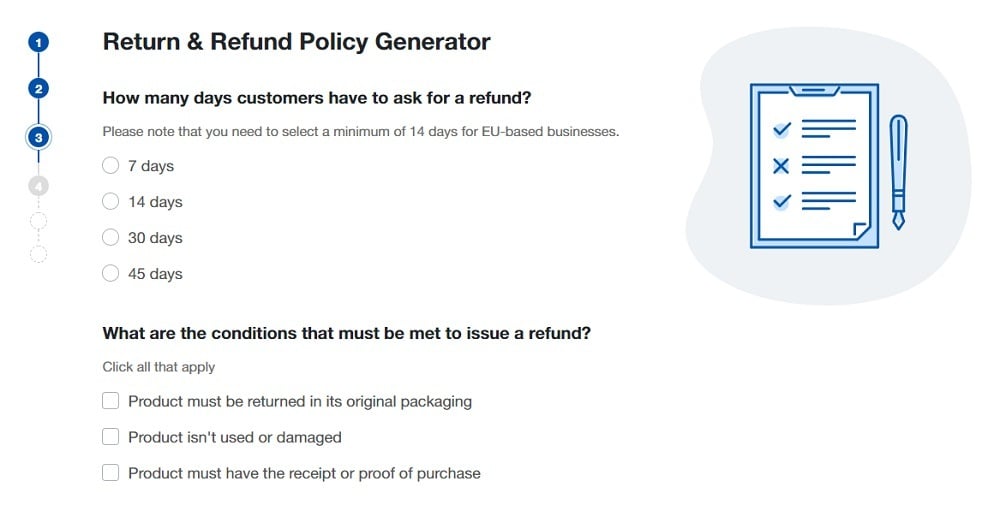
-
Enter an email address where you'd like to receive your Return and Refund Policy and click "Generate."
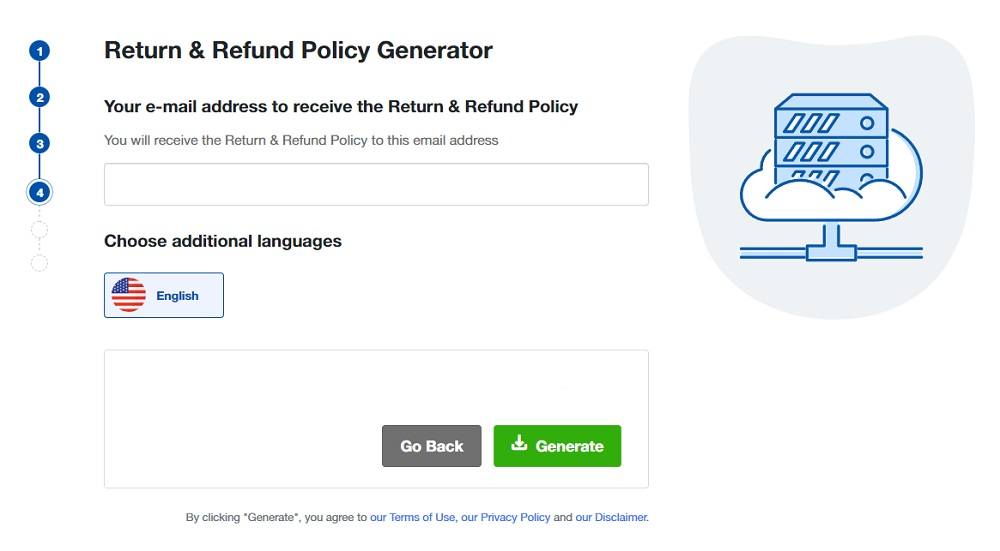
Done! You'll be able to instantly access and download your new Return and Refund Policy.
- 1. What is a No Cancellation Policy?
- 2. What Does the Law Say About No Cancellation Policies?
- 3. Benefits of No Cancellation Policies
- 3.1. Discourage Cancellations and No-Shows
- 3.2. Reduce Losses Suffered
- 3.3. Maintain a Structured Schedule and Minimize Disruptions
- 4. Disadvantages of No Cancellation Policies
- 5. Best Practices for Drafting Your No Cancellation Policy
- 5.1. Clearly Describe the Terms of Your Policy
- 5.2. Use Simple Language
- 5.3. Send Periodic Reminders to Clients
- 6. Examples of No Cancellation Policies
- 7. Where to Display Your No Cancellation Policy
- 8. How to Make Your No Cancellation Policy Enforceable
- 9. Summary
What is a No Cancellation Policy?
A No Cancellation Policy is simply an agreement put in place to notify clients about how a business handles the cancellation of a scheduled appointment.
To put things in context, a No Cancellation Policy is essentially equivalent to a No Return, No Refund Policy but is generally used by businesses that offer recurring client-based services rather than products. Examples include therapy practices, hair styling services, nail salons, spas, tutoring agencies, personal trainers, and counseling agencies, to name a few.
As a business owner, a No Cancellation Policy lets your clients know that you intend to charge them for every appointment they book with your business, whether or not they meet up with the appointment.
Clients can always reschedule their appointment to a more convenient time, but only if they provide enough notice (as stipulated in your agreement). This way, the canceled time slot can be used to book other clients.
Typical notice periods (or cancellation windows) for businesses of this nature are between 24 to 72 hours. However, depending on your specific business needs, you may extend your notice period further.
At any rate, if clients are unable to meet up with their appointments or reschedule, they will be charged a cancellation/no-show fee.
Understandably, some business owners may feel uncomfortable or even guilty about implementing a No Cancellation Policy as it's generally perceived to be "strict." But it's important to understand that the primary goals of this policy are:
- To deter clients from appointment cancellations and no-shows
- To ensure that you (as a business owner) are fairly compensated for your time, and
- To recoup losses suffered due to the cancellation of an appointment
So, while a No Cancellation Policy may be strict, it's nonetheless important to ensure that your business enjoys the benefits of keeping a consistent schedule and doesn't suffer the adverse effects of cancellations and no-shows.
With that being said, you may need to show some discretion in certain instances where clients are unavailable due to circumstances beyond their control (e.g., extreme weather or personal injury).
You may also offer alternative options to avoid charging cancellation fees, including but not limited to:
- Offering virtual or online sessions (if applicable), and
- Waiving fees for first-time no-shows or periodically (e.g., for two absences per year)
In any case, your No Cancellation Policy should be tailored to suit your specific business needs while ensuring that it's also considerate of clients, especially during emergencies.
Now, let's briefly see what the law says about implementing a No Cancellation Policy.
What Does the Law Say About No Cancellation Policies?

Generally speaking, consumer laws do not directly address No Cancellation Policies. That said, the laws in many countries give consumers the right to cancel their scheduled appointments.
While this may seem to oppose the goal of a No Cancellation Policy, it's important to clarify that maintaining a No Cancellation Policy doesn't necessarily mean that clients cannot cancel their scheduled appointments.
Instead, having this policy means that clients will incur a financial penalty or fee for cancellations and no-shows, and many consumer laws support this.
Regarding the actual cancellation fees, consumer laws are unanimous in requiring businesses to charge consumers fairly and reasonably for cancellations and no-shows.
In particular, businesses must ensure that their cancellation fees reflect the actual damages or losses suffered directly as a result of the cancellation.
For example, the UK Competition and Markets Authority explicitly states that:
"If you cancel the contract, the business is generally only entitled to keep or receive an amount sufficient to cover their actual losses that directly result from your cancellation (e.g., costs already incurred or loss of profit). Businesses must take reasonable steps to reduce their losses (e.g., by re-selling the goods or services). Non-refundable deposits should only be a small percentage of the total price.Cancellation charges must be a genuine estimate of the business' direct loss."
The Australian Consumer law, on the other hand, simply states that the Terms and Conditions of any contract with a consumer must be "fair and not unreasonable."
Next up, we'll look at some of the benefits of implementing a No Cancellation Policy.
Benefits of No Cancellation Policies

If you're interested in the idea of having a No Cancellation Policy but not quite sure if it's right for your business, read on as we go over the major benefits of implementing this policy.
Discourage Cancellations and No-Shows
More often than not, clients miss or cancel their scheduled appointments with a business simply because of a lack of commitment. This is because no accountability or consequence is attached to canceled or missed sessions.
However, thanks to the financial penalty, implementing a No Cancellation Policy will serve to discourage clients from missing their appointments. As a result, any canceled or missed appointments would more likely only be due to genuine emergencies.
Reduce Losses Suffered
Ideally, every appointment booked by clients should bring your business income. When clients cancel their sessions without adequate notice or don't show up at all, your business loses the revenue that could have been made had the time slot been used to book or attend to other clients.
Moreover, depending on the nature of your business, you could suffer additional losses from the resources expended to prepare for client sessions. For example, when a client misses a hotel reservation, the hotel may suffer losses like the staff remuneration for that particular shift.
In essence, having a No Cancellation Policy can help you significantly minimize losses suffered from cancellations and no-shows.
Maintain a Structured Schedule and Minimize Disruptions
With a No Cancellation Policy in place, clients are more inclined to meet up with their scheduled appointments. This, in turn, helps you maintain a structured business schedule as well as significantly minimize disruptions.
Of course, maintaining a structured schedule and minimizing disruptions will result in a smooth and consistent workflow for your business which will, in the long run, improve your bottom line.
Disadvantages of No Cancellation Policies

While a No Cancellation Policy undoubtedly presents considerable benefits for your business, there are also certain disadvantages to implementing this policy.
The most significant of these disadvantages is the likelihood of a drop in the number of appointment bookings and conversions since some clients are naturally put off by cancellation/no-show fees. Ultimately, this may lead to a decline in your bottom line.
Though less likely to occur, implementing a No Cancellation Policy may also prompt negative reviews from some clients about your business due to the perception of rigidity associated with this policy.
Best Practices for Drafting Your No Cancellation Policy

To create a transparent and effective No Cancellation Policy that showcases fair business practices, we recommend observing the following best practices: Clearly describe your terms in simple language, and remind your clients about their appointments as well as your policy.
Let's look at each in more detail.
Clearly Describe the Terms of Your Policy
As mentioned earlier, your No Cancellation Policy should clearly describe key details about your cancellation practices, most especially your notice period and cancellations/no-shows fees.
Other essential details to include are as follows:
- What type of service(s) your business provides
- When the cancellation fee applies
- What exceptions apply for true emergencies
- Alternative options for added convenience (if applicable)
Recall that your cancellation fee must be a genuine estimate of your business's direct loss. For example, suppose you run a restaurant, and a client cancels their reservation weeks in advance. In this case, your cancellation fee should be significantly reduced since you can easily book another client to fill that time slot.
Use Simple Language
Using complicated or technical terms when drafting your No Cancellation Policy can only cause problems for your business. Clients may misunderstand your policies, which may prompt disputes that ultimately hurt your relationship with them.
It's therefore essential (and a best practice) to use simple and concise language when drafting your agreement, as this ensures that clients easily understand your terms.
Send Periodic Reminders to Clients
Clients sometimes miss their scheduled appointments with your business simply because they forgot. Sending them periodic reminders not only resolves this issue but promotes your professional image and shows your commitment to serving them.
Moreover, you can reduce your workload by automating this process with modern applications, thereby giving you more time to just focus on providing your actual services.
Examples of No Cancellation Policies

To get a practical idea of how you can properly structure and present this policy, let's see some examples of No Cancellation Policies published by businesses.
BN Counseling provides a detailed statement of its practices regarding cancellations and missed appointments in a simple and easy-to-comprehend language. The fee for canceling without the required 48-hour notice is noted in bold to make sure it's more difficult to miss:
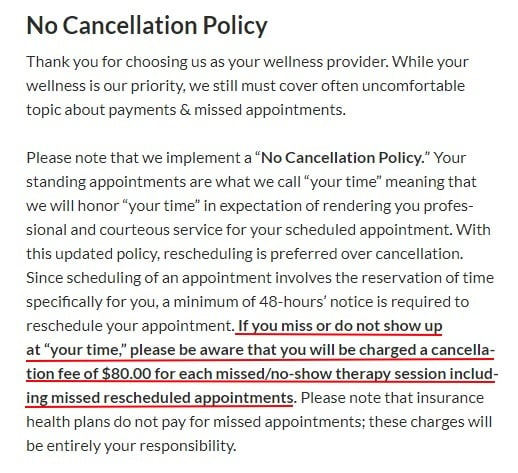
A section is included to acknowledge that emergencies do happen and that the company will work with its clients in the event of true emergencies that result in missed appointments:
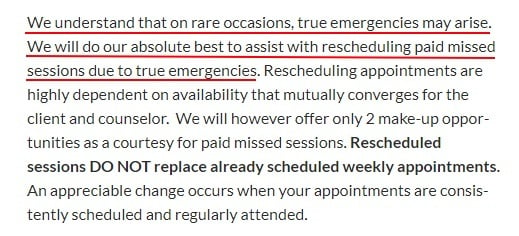
Moreover, BN Counseling lets clients understand why this policy is in the best interest of all involved:
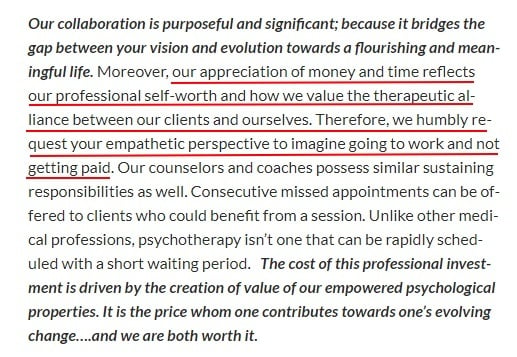
The Hideaway has a policy that requires clients to provide at least 24 hours notice if they wish to cancel or reschedule their appointments. Failure to do this will prompt a cancellation fee equivalent to the total amount for the service:
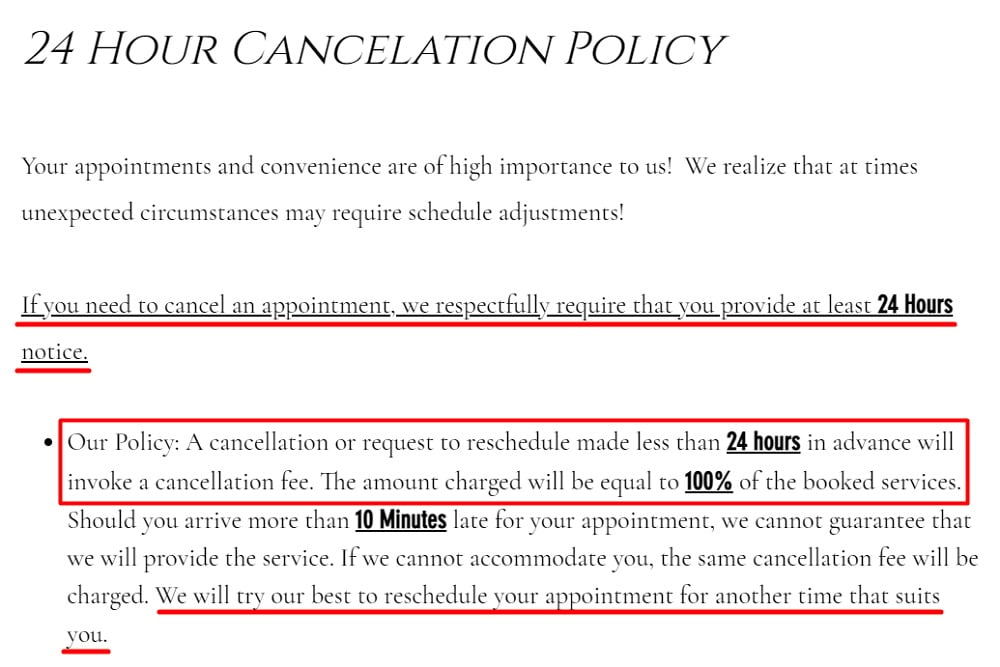
Dyad Psychology provides a document that outlines its cancellation practices, fees, occasional benefits, and alternative options for clients who wish to book an appointment:
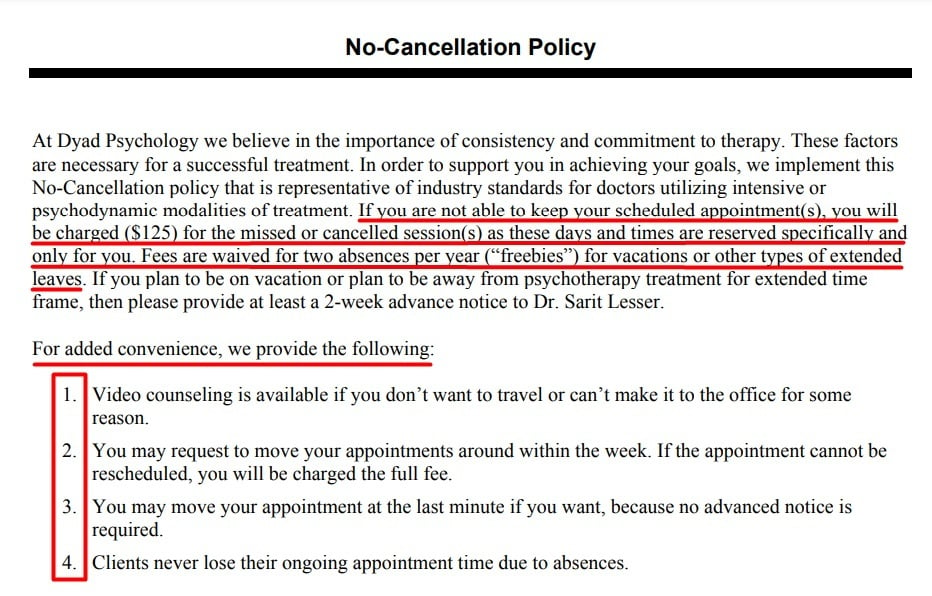
Kate's Tutoring requires clients who wish to reschedule their sessions to provide 48 hours prior notice so that the time slot can be filled. Otherwise, the full rate for services will be charged as shown below:
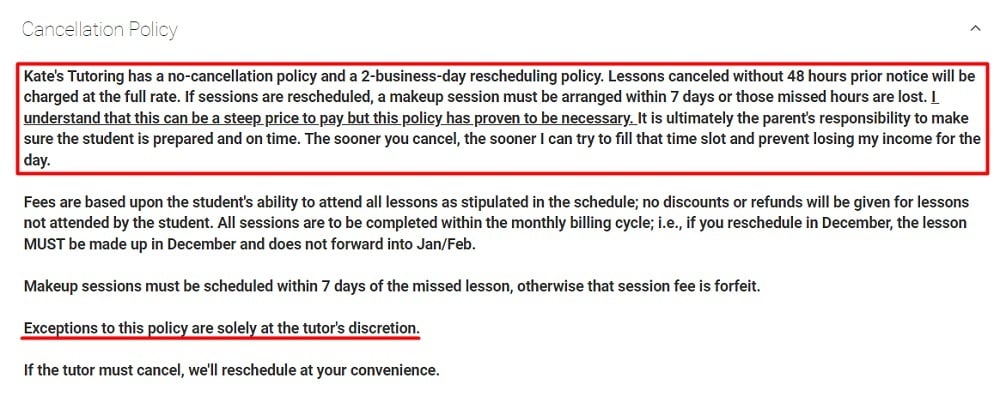
Note how exceptions might occur in certain instances based on the business owner's discretion.
Next, let's briefly go over where you can display your No Cancellation Policy once it's drafted.
Where to Display Your No Cancellation Policy

To make your policy easily accessible to clients, you should include links in prominent locations such as your website footer, booking forms, email messages, and FAQ page, to mention a few.
It's generally considered a best practice for businesses to display their policies in conspicuous locations so clients can easily access them before registering or booking an appointment. This is especially important for sensitive agreements like a No Cancellation Policy.
In practice, you can either include your No Cancellation Policy in your Terms and Conditions agreement or address it separately.
Here's how Precision Microblading displays its Cancellation Policy alongside other legal agreements in its website footer:

WellSpring Family Practice displays its Appointment Cancellation/No-Show Policy alongside other forms when clients book their appointments:
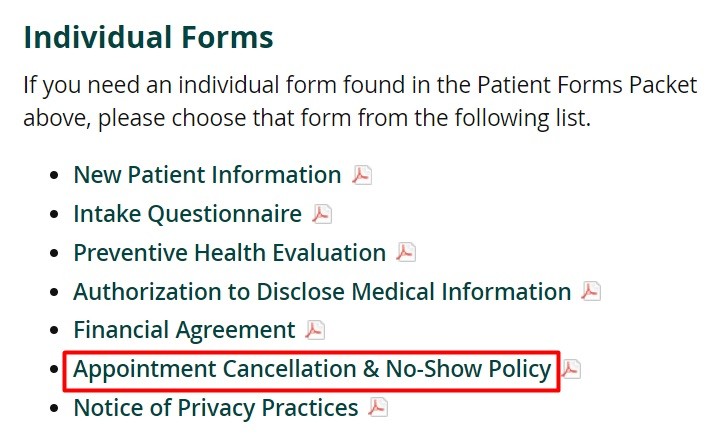
Remember to make sure you display your No Cancellation Policy in a conspicuous place where people will be able to access it both before and after they make an appointment with you.
How to Make Your No Cancellation Policy Enforceable

It's not enough to display your No Cancellation Policy in prominent places. You also need to get explicit agreement from clients to make your policy enforceable.
Typical ways to do this include getting clients to:
- Sign a document
- Tick an empty checkbox on your website that outlines the terms of the policy, or
- Click an "I Agree" checkbox or button on your website
Let's see some examples:
Dyad Psychology includes a statement of agreement in its No Cancellation Policy and requires clients' signatures to confirm their consent to the policy:

Alternatively, Broadway singing teacher Andrew Byrne obtains explicit agreement from new students by presenting them with an empty checkbox to tick:

Summary
Appointment cancellations and no-shows are inevitable when running a client-based business. However, implementing a No Cancellation Policy can significantly reduce their occurrence and ensure that you're fairly compensated if they do occur.
Although a No Cancellation Policy is not without its drawbacks, the benefits essentially outweigh the disadvantages.
To recap, when implementing a No Cancellation Policy, it's important to:
- Clearly describe the terms of your policy
- Use simple, straightforward language, and
- Send periodic reminders to clients (preferably automated)
Remember to display your No Cancellation Policy in conspicuous locations, especially during your booking or registration process. Finally, explicit agreement is needed from clients to make your policy enforceable.

Comprehensive compliance starts with a Privacy Policy.
Comply with the law with our agreements, policies, and consent banners. Everything is included.
